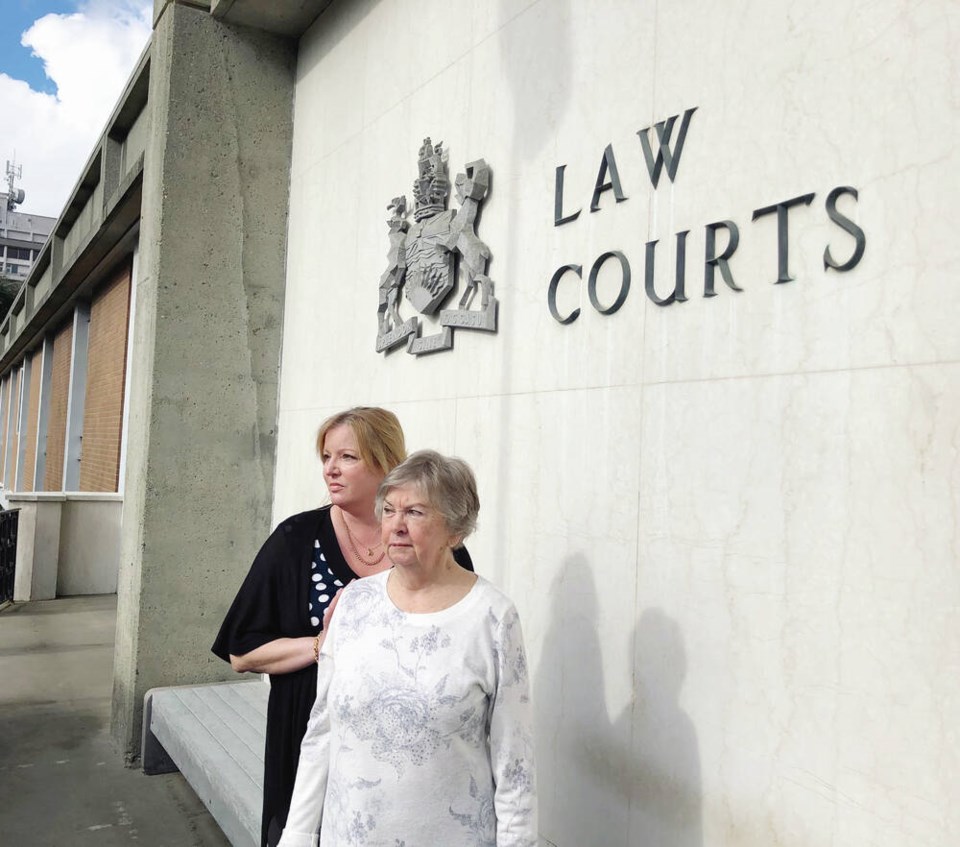The mother of a woman who was critically injured when she was hit by a Jeep on Central Saanich Road five years ago is relieved a court decision to award her daughter $5.5 million for her future care has been upheld on appeal.
Tracey Ann Ward suffered a catastrophic brain injury in the Aug. 27, 2018, crash that killed her sister, massage therapist Kim Ward.
The two had been walking their dogs after dinner with their mother that evening when a Jeep crossed the centre line and struck them after driver Anthony Thomas lost consciousness.
Thomas was found guilty of impaired driving causing death and impaired driving causing bodily harm and sentenced to three and a half years in prison.
The sisters’ mother Ellen Ward, now 83, called the court decision “kind of like a Christmas miracle.”
“It’s a big relief to know the money will be there to look after her. I sure as heck won’t be around forever,” Ward said. “It’s good to get the good news and know that that part is settled.”
Ward said Christmas is a hard time for her, with Kim gone and Tracey in a care facility. “I want Christmas over with, there’s no two ways about it.”
In February 2022, Ward launched a civil suit in B.C. Supreme Court against Thomas, the Harris Victoria car dealership and Aggatha Siah, a woman who had signed a purchase agreement to buy the Jeep.
In July, Justice Brenda Brown found Thomas was negligent and that the car dealership, as owner of the Jeep, was vicariously liable and responsible for paying $5.5 million.
The car dealership appealed. But on Wednesday, in a unanimous decision, the court dismissed its appeal.
Ward hopes the money will be enough to care for Tracey, who lives in a long-term care facility in Sidney that costs more than $12,000 a month.
“Who knows how long Tracey will live. She is 53 and she could be around another 20 years,” said Ward.
On Thursday morning, Ward was on her way to visit Tracey and share the good news, but was doubtful her daughter would understand.
“The last time I had to go to court, I told her: ‘I won’t be here tomorrow. I’m going to court. She said: ‘Oh why?’ And I said: ‘Well, Tracey we are suing the people who are responsible for you being in here. We have to get money so you’re looked after for the rest of your life.’ And it was just like ‘Oh OK.’ ”
Darren Williams, the lawyer representing the Wards, said he will be making a further application for the expenses Tracey will incur for management of her estate, which could amount to another $1 million.
During the civil trial, the court heard that Siah went to the dealership on Aug. 18, 2018 and signed an agreement to buy the 2019 Jeep. Harris Victoria allowed her to keep the car for 10 days while they tried to find financing for her.
At the end of the ninth day, Thomas was at the home of Siah’s partner’s mother on Central Saanich Road when he was handed the keys and asked to run an errand. Nobody was aware he had consumed methamphetamine earlier in the afternoon.
The judge found that Siah did not own the Jeep because she did not have financing and that the dealership had given implied consent to Siah’s friends or family to use the car. The judge rejected the argument that because the dealership was unaware of Thomas’s drug consumption, it did not consent to him driving the car.
The Court of Appeal found that even though the dealership had signed a bill of sale for the car, it was intended merely as a document to be shown to police in the event Siah was pulled over during the 10-day period.
The dealership was clearly “an owner in possession” at the time of the accident, it said.
The court also said the owner-responsibility sections of the Motor Vehicle Act exist to encourage owners to be careful in lending their cars and to broaden their vicarious liability so injured victims can look to owners for recovery of damages.
The tragic case is a good example of why car dealerships need to be more careful about how they sell cars, said Williams.
“It was the practice in this dealership, and other dealerships, to put people in cars and let them leave the lot to get them to buy the car. They call this puppy-dogging, an industry term I’ve learned in the course of this case. Put the person in the car and get them to take the car home because they fall in love with the puppy, then they want to buy it,” said Williams.
Somebody who lends their car to someone else can’t say in hindsight that they wouldn’t have lent it if they’d known certain facts about the person, because it would rob the legislation of the protection it provides people like Tracey, said Williams.
“And the big policy reason behind it is the insurance legislation is designed to provide the public protection from underinsured motorists. It makes the owner of a vehicle liable for the actions of the driver of the vehicle,” said Williams.
“In this case, the dealership was found to be the owner, even though the car was lent to Aggatha Siah, who lent it to someone else, who lent it to Mr. Thomas. The dealership was still responsible because they said anyone could drive it because it’s in their business interests to sell more cars.”
Harris Victoria has 60 days to apply for leave to appeal to the Supreme Court of Canada.




